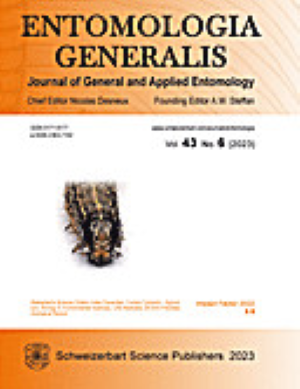生命史理论解释了所观察到的 Tuta absoluta 化蛹时年龄和大小的可塑性
IF 4.6
1区 农林科学
Q1 ENTOMOLOGY
引用次数: 0
摘要
我们探讨了观察到的 Tuta absoluta 化蛹时年龄和体型的可塑性,以应对缺水和缺营养的情况。通过使用一个最小理论模型,我们证明所观察到的可塑性可被视为个体在压力环境条件下旨在最大化繁殖产出的一种策略性适应。我们发现,T. absoluta 的可塑性符合生活史理论基本原理的预期。本文章由计算机程序翻译,如有差异,请以英文原文为准。
Life history theory explains observed plasticity in Tuta absoluta age and size at pupation
We explore the observed plasticity in Tuta absoluta age and size at pupation in response to water and nutrients scarcity. Using a minimal theoretical model, we demonstrate that the observed plasticity can be viewed as a strategic adaptation of individuals aimed at maximizing their reproductive output under stressful environmental conditions. T. absoluta plasticity is then found to align with expectations from fundamental principles of life history theory.
求助全文
通过发布文献求助,成功后即可免费获取论文全文。
去求助
来源期刊

Entomologia Generalis
生物-昆虫学
CiteScore
7.10
自引率
18.80%
发文量
72
审稿时长
>12 weeks
期刊介绍:
Its scope covers all aspects of basic and applied research dealing with insects and more broadly with arthropods inhabiting wild, agricultural and/or urban habitats. The journal also considers research integrating various disciplines and issues within the broad field of entomology and ecology.
Entomologia Generalis publishes high quality research articles on advances in knowledge on the ecology and biology of arthropods, as well as on their importance for key ecosystems services, e.g. as biological control and pollination. The journal devotes special attention to contributions providing significant advances (i) on the fundamental knowledge and on sustainable control strategies of arthropod pests (including of stored products) and vectors of diseases, (ii) on the biology and ecology of beneficial arthropods, (iii) on the spread and impact of invasive pests, and (iv) on potential side effects of pest management methods.
Entomologia Generalis welcomes review articles on significant developments in the field of entomology. These are usually invited by the editorial board, but proposals may be sent to the Editor-in-Chief for preliminary assessment by the editorial board before formal submission to the journal. The journal also considers comments on papers published in Entomologia Generalis, as well as short notes on topics that are of broader interest.
 求助内容:
求助内容: 应助结果提醒方式:
应助结果提醒方式:


